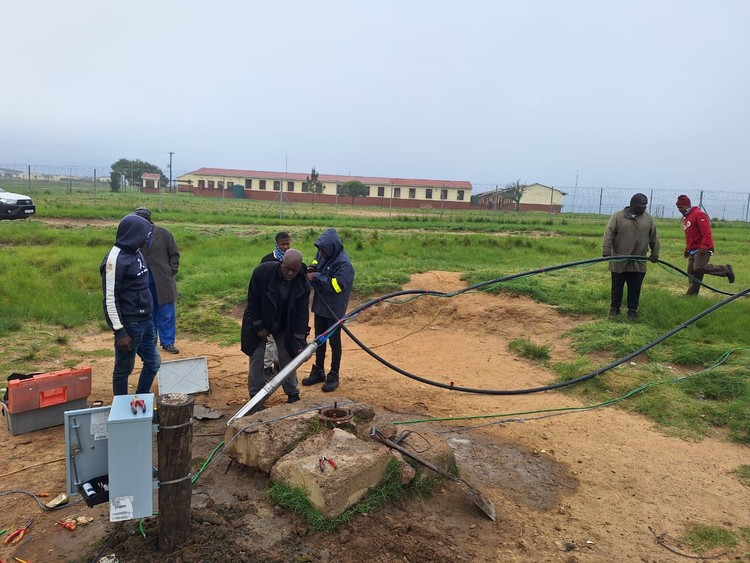KZN villagers use social grants to fix broken taps, pipes and pumps
Ndatshana residents say they were without running water for seven years
Youngsters from the Ndatshana community in rural KwaZulu-Natal install water pumps and pipes purchased by residents last year so that they can access running water. Photo supplied.
Frustrated villagers in Ndatshana, near Nquthu in rural KwaZulu-Natal, have used their social grants to contribute towards fixing old water pipes and installing basic infrastructure.
Taps in the community had been dry for seven years, according to the residents. People would spend up to three hours fetching water from the communal borehole. They said their water infrastructure is old and has never been repaired by the Umzinyathi District Municipality.
So in July last year, the villagers agreed to collect R300 from each household to raise enough money to hire plumbers, buy two water pumps (worth about R36,000 each), taps and pipes.
When we visited Ndatshana last week, Phindile Gumbi was collecting R100 from community members to fix one of the pumps.
“Most people here depend on social grants and government pensions. We actually can’t afford [to contribute] this money but we are forced to pay it because it helps us access water,” said Gumbi.
Khethiwe Masango said she was paying her family’s share because they no longer wanted to walk long distances with heavy wheelbarrows filled with water containers.
Thandeka Ngobese, spokesperson for the Umzinyathi District Municipality, promised to respond to our questions related to the collapse of water infrastructure in Ndatshana on 8 October but had failed to do so at the time of publication.
The Witness reported earlier this year that the South African Human Rights Commission had visited the district to monitor progress following its 2023 report that revealed Umzinyathi was among four KZN municipalities with significant backlogs, ageing infrastructure, corruption and non-payment of services.
Among the commission’s recommendations was for the municipality to implement water delivery plans such as water tanks managed by local ward councillors. The municipality was also meant to address corruption related to the water tanker system, and prioritise fixing high water losses, among other things.
Published in partnership with Intuthuko News.
Support independent journalism
Donate using Payfast

Don't miss out on the latest news
We respect your privacy, and promise we won't spam you.
Next: Ombud lambasts Legal Practice Council
Previous: PRASA dealt with the Foreshore evictees in bad faith, says Ndifuna Ukwazi attorney
© 2024 GroundUp. This article is licensed under a Creative Commons Attribution-NoDerivatives 4.0 International License.
You may republish this article, so long as you credit the authors and GroundUp, and do not change the text. Please include a link back to the original article.
We put an invisible pixel in the article so that we can count traffic to republishers. All analytics tools are solely on our servers. We do not give our logs to any third party. Logs are deleted after two weeks. We do not use any IP address identifying information except to count regional traffic. We are solely interested in counting hits, not tracking users. If you republish, please do not delete the invisible pixel.

